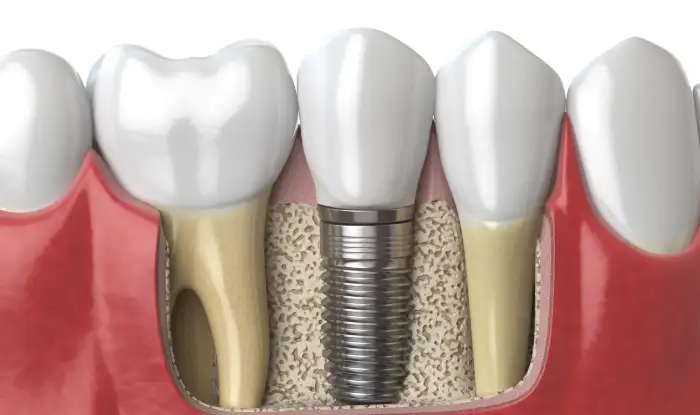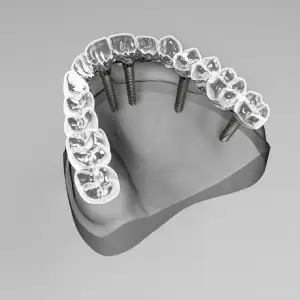Dental implants are widely considered the gold standard for replacing missing teeth offering unmatched durability, function, and aesthetics. But one of the most common questions we get at Centers for Dental Implants is:
How much do dental implants actually cost in the USA?
The answer isn’t always simple, as implant costs can vary significantly based on your needs, the materials used, and additional treatments involved. In this guide, we break down the typical pricing, what factors influence the cost, and how our Florida clinics in Aventura, Hallandale Beach, and Pembroke Pines help make implants affordable and accessible.
Average Cost of Dental Implants in the USA
On average, a single dental implant in the United States can cost anywhere from $3,000 to $6,000. This price typically includes:
- The titanium implant post
- The abutment (connector)
- The dental crown (visible part)
- Consultations, X-rays, and follow-up visits
If you need additional procedures such as bone grafting, tooth extractions, or sinus lifts, the total cost can rise by $500–$3,000 per procedure.
Cost Breakdown (Per Tooth):
| Component | Estimated Cost (USD) |
| Implant post (surgical) | $1,000 – $2,000 |
| Abutment & crown | $1,000 – $2,000 |
| Diagnostic imaging & exam | $100 – $500 |
| Additional procedures | $500 – $3,000 |
Full-mouth restorations like All-on-4 implants can range from $15,000 to $30,000 per arch, depending on materials and complexity.
What Factors Affect the Cost of Dental Implants?
Every smile is different, so several variables impact the total cost of treatment. These include:
1. Number of Implants Needed
The total cost increases with the number of implants required. Replacing a single tooth is more affordable than restoring multiple teeth or a full arch. Full-mouth reconstructions or multiple implant placements involve more time, materials, and planning, which naturally raises the overall treatment cost.
2. Location of the Tooth
Implants placed in the front of the mouth, known as the esthetic zone, require greater precision and cosmetic customization to match the surrounding teeth. These cases often involve additional planning and specialized materials, leading to slightly higher costs compared to implants in less visible areas.
3. Need for Preparatory Procedures
Some patients may require additional treatments such as bone grafting, tooth extractions, or sinus lifts to prepare the jaw for implant placement. These procedures add to the total cost but are essential for ensuring the long-term success and stability of the dental implant.
4. Type of Restoration
Dental implants can support various restorations, including crowns, bridges, or dentures. A single crown is typically less costly than a full-arch bridge or implant-supported denture. The complexity and materials involved in the final restoration play a significant role in determining overall treatment expenses.
5. Materials Used
Titanium implants are widely used and cost-effective, but patients may opt for zirconia implants or premium ceramic crowns for aesthetic or biocompatibility reasons. These upgraded materials tend to increase the total cost, especially in visible areas where appearance is a primary concern.
6. Dentist’s Experience and Location
The expertise of your implant surgeon and the location of the dental practice affect cost. Highly experienced professionals and clinics equipped with cutting-edge technology may charge more, but they offer improved precision, higher success rates, and superior long-term outcomes for complex implant cases.
Are Dental Implants Worth the Cost?
Absolutely. While the upfront investment may seem high, dental implants offer unmatched long-term value. They:
- Last 15–25+ years (often for life)
- Preserve jawbone and facial structure
- Restore bite strength and function
- Look and feel like natural teeth
- Require no special maintenance beyond daily brushing and flossing
Compared to bridges or dentures, implants are more durable and cost-effective over time.
Does Insurance Cover Dental Implants?
Most dental insurance plans do not cover the full cost of implants, but may cover parts of the treatment like:
- Extractions
- Bone grafting
- Implant crowns
- Diagnostic imaging
Medical insurance may offer coverage in cases of trauma, disease, or reconstructive surgery. Patients can also use FSA or HSA accounts to reduce out-of-pocket costs.
At Centers for Dental Implants, our team will help you review your insurance benefits and handle pre-authorizations or claims.
Financing Options at Centers for Dental Implants
We believe everyone deserves access to world-class dental care. To help manage the cost of treatment, we offer:
- 0% interest financing plans
- Monthly payment options
- Package pricing for full-mouth cases
- CareCredit and other healthcare credit programs
- Transparent pricing with no hidden fees
Our financial coordinators are here to walk you through every option and create a plan that fits your budget.
Why Choose Centers for Dental Implants?
With state-of-the-art clinics in Aventura, Hallandale Beach, and Pembroke Pines, our team provides exceptional care at every step of your implant journey. Led by Dr. Arun K. Garg, a globally recognized implant expert and educator, we offer:
- Decades of surgical and restorative experience
- High-quality implants and restorations
- Advanced 3D imaging and surgical planning
- Personalized, compassionate treatment
- Honest pricing with no pressure
We don’t just place implants, we restore smiles, health, and confidence.
FAQs
1. Why do dental implants cost more than other tooth replacements?
Implants involve surgery, custom materials, and precise planning, which makes them more complex than bridges or dentures.
2. Can I get implants if I have bone loss?
Yes. You may need a bone graft or sinus lift first, which will add to the cost. Our team will assess your case.
3. Are same-day dental implants more expensive?
Same-day implants can be slightly more expensive due to advanced planning and immediate restoration, but they reduce total visits.
4. What happens if I can’t afford to pay all at once?
We offer flexible financing options and monthly payment plans to make your treatment affordable over time.
5. Are dental implants tax-deductible?
Yes. In many cases, implant costs can be claimed as a medical expense. Speak with your tax advisor for details.
6. Will Medicare or Medicaid cover dental implants?
Original Medicare typically does not cover implants. Medicaid coverage varies by state and usually only includes basic dental care.
7. How can I reduce the cost of implants?
Using your FSA/HSA, choosing standard materials, and opting for in-house dental plans or bundles can help lower costs.
Your Dream Smile Starts Here
Dental implants are a long-term solution that pays off with better health, function, and confidence. At Centers for Dental Implants, we combine expertise, advanced technology, and compassionate care to deliver stunning, lasting results at a cost that makes sense.
Schedule your consultation today at one of our three Florida clinics: Aventura, Hallandale Beach, or Pembroke Pines and let us show you how easy and affordable restoring your smile can be.


